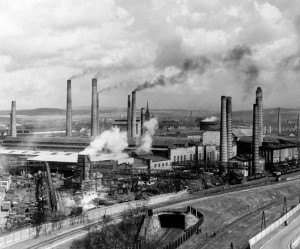Earth on track to be hottest in 11.3 millennia—study

In this Aug. 29, 1938, file photo, smoke rises from smokestacks at Skoda’s main foundry in Pilsen, Czechoslovakia. A new study looking at 11,000 years of climate temperatures shows the world in the middle of a dramatic U-turn, lurching from near-record cooling to a heat spike. It shows how the globe for several thousands of years was cooling until an unprecedented reversal in the 20th century, which scientists say is further evidence that global warming isn’t natural but man-made since the start of the Industrial Revolution. The research was released Thursday, March 7, 2013 in the journal Science. AP PHOTO
WASHINGTON—The Earth is on track to becoming the hottest it has been at any time in the past 11.3 millennia, a period spanning the history of human civilization, a study published Thursday has found.
Based on fossil samples and other data collected from 73 sites around the world, scientists have been able to reconstruct the history of the planet’s temperature from the end of the last Ice Age around 11,000 years ago to the present.
They have determined that the past 10 years have been hotter than 80 percent of the last 11,300 years.
But virtually all the climate models evaluated by the Intergovernmental Panel on Climate Change predict that the Earth’s atmosphere will be hotter in the coming decades than at any time since the end of the Ice Age, no matter what greenhouse gas emission scenario is used, the study found.
“We already knew that on a global scale, Earth is warmer today than it was over much of the past 2,000 years,” said Shaun Marcott, the lead author of the study, which was published in Science.
“Now we know that it is warmer than most of the past 11,300 years. This is of particular interest because the Holocene spans the entire period of human civilization,” said Marcott, who is a post-graduate researcher at Oregon State University.
The data show that temperatures cooled by 0.8 degrees Celsius over the past 5,000 years, but have been rising again in the past 100 years, particularly in the northern hemisphere where land masses and population centers are larger.
The climate models project that average global temperatures will rise by 1.1 to 6.3 degrees Celsius (2.0 and 11.5 degrees Fahrenheit) by the end of the century, depending on the level of C02 emissions resulting from human activities, the researchers found.
“What is most troubling is that this warming will be significantly greater than at any time during the past 11,300 years,” said Peter Clark, a paleoclimatologist at Oregon State.
The Earth’s position with respect to the Sun is the main natural factor affecting temperatures during that time, the scientists said.
“During the warmest period of the Holocene, the Earth was positioned such that Northern Hemisphere summers warmed more,” Marcott said.
“As the Earth’s orientation changed, Northern Hemisphere summers became cooler, and we should now be near the bottom of this long-term cooling trend—but obviously, we are not.”
Other studies have concluded that human activities—not natural causes—have been responsible for the warming experienced over the past 50 years.